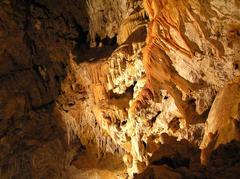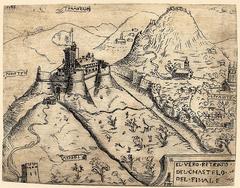Ponte Dell’Acqua: Comprehensive Guide, Visiting Hours, and Travel Tips for Finale Ligure’s Roman Heritage
Date: 14/06/2025
Introduction
Ponte dell’Acqua, nestled in the verdant Val Ponci near Finale Ligure, Italy, is a testament to Roman engineering and the rich cultural legacy of Liguria. As one of five Roman bridges built to support the ancient Via Iulia Augusta, this single-arch structure offers a unique journey into antiquity. Today, the area invites visitors to explore a landscape interwoven with history, nature, and ongoing preservation efforts, making Ponte dell’Acqua a must-see for travelers interested in both cultural heritage and outdoor adventure (hikingfinaleligure.jimdofree.com; Passeggiare in Liguria; Finale Outdoor Region; Official Finale Ligure Tourism).
This guide covers Ponte dell’Acqua’s history, architectural features, practical visitor information, and recent infrastructure enhancements, ensuring you have everything you need for a memorable and responsible visit.
Historical Context and Roman Heritage
The Via Iulia Augusta, constructed under Emperor Augustus (13–12 BCE), was a crucial Roman road linking Piacenza in northern Italy to Arles in southern France. To navigate the steep terrain of Liguria, the road diverted inland, descending from the Magnone Pass into the Ponci Valley. Here, five Roman bridges—including Ponte dell’Acqua—enabled travelers to cross waterways safely. These structures remain among the best-preserved examples of Roman civil engineering in the region (hikingfinaleligure.jimdofree.com; Official Finale Ligure Tourism).
The Roman Bridges of Val Ponci
From east to west, the valley’s five Roman bridges are:
- Ponte delle Fate (Fairies’ Bridge)
- Ponte Sordo (Deaf Bridge)
- Ponte Muto (Mute Bridge)
- Ponte dell’Acqua (Water Bridge)
- Ponte di Magnone (Magnone Bridge)
Ponte dell’Acqua is renowned for its preservation and accessibility, allowing visitors to experience Roman construction techniques firsthand (hikingfinaleligure.jimdofree.com).
Architectural Features and Construction
The Roman bridges of Val Ponci exemplify the “gallo-ligure” style. Key features include:
- Single Arch: Each bridge, including Ponte dell’Acqua, features a single arch with a double ring of carefully laid stone voussoirs.
- Materials: The bridges are constructed from locally sourced “pietra del Finale” limestone (except Ponte di Magnone, which uses quartzite).
- Building Technique: “Petit appareil” masonry—regular, small limestone blocks set in horizontal courses and bonded with mortar around a Roman concrete core (catalogo.beniculturali.it).
- Integration: The structures harmoniously blend with the surrounding landscape, reflecting the Roman approach to infrastructure and nature.
Visiting Ponte dell’Acqua: Practical Information
Hours and Tickets
- Access: Year-round, free of charge; no entrance fee or ticket required.
- Recommended Hours: Visit during daylight (dawn to dusk) for safety and best viewing.
Getting There
- Trailhead: Start in Verzi (above Calvisio, Finale Ligure). The well-marked trail follows the ancient Via Iulia Augusta.
- Distance: The full Val Ponci route, including all bridges, is about 5 km one way.
- Trail Difficulty: Easy to moderate; suitable for hikers, mountain bikers, and families with older children.
- Parking: Available near the trailhead.
Accessibility
- The paths are natural and uneven, so sturdy shoes are recommended.
- The site is not fully accessible for wheelchairs; those with limited mobility should consult the local tourist office for tailored advice.
Guided Tours
- Archeotrekking tours are available through the Archaeological Museum of Finale and local tourism offices.
- Booking ahead is recommended, especially during peak seasons.
Best Times to Visit
- Spring and Autumn: Mild weather, lush vegetation, and fewer crowds provide the most enjoyable experience.
- Summer: Hotter temperatures; bring water and sun protection.
Recent Infrastructure Developments
Railway Bridge Replacement (2025)
In January 2025, the nearby historic railway bridge over the Bottassano stream was replaced by a modern metal deck to improve flood resilience, expand the riverbed crossing, and ensure safety for both the railway and local environment (RFI News). The upgrade aligns with regional climate adaptation and environmental standards, demonstrating an ongoing commitment to preserving local heritage and infrastructure.
Conservation and Sustainable Tourism
Ponte dell’Acqua and its companion bridges are protected archaeological sites with ongoing conservation programs. Visitors are encouraged to:
- Stay on marked trails to prevent erosion.
- Avoid littering and respect the natural environment.
- Support sustainable tourism initiatives that help preserve Liguria’s heritage (Passeggiare in Liguria; Finale Outdoor Region; Comune di Finale Ligure).
Nearby Attractions
- Other Roman Bridges: Explore Ponte delle Fate and Ponte Sordo along the same trail.
- Arma delle Manie Cave: A prehistoric site with evidence of Neanderthal habitation.
- Finalborgo: A medieval village offering museums, shops, and traditional Ligurian cuisine.
- Nature Walks and Outdoor Activities: Climbing, mountain biking, and hiking opportunities abound (Visit Finale Ligure).
Visuals and Media
- Maps and interpretive panels are available at the tourist office and along the trail.
- Alt text suggestions: “Ponte dell’Acqua Roman bridge in Val Ponci” and “Hiking trail to Ponte dell’Acqua in Finale Ligure.”
Frequently Asked Questions (FAQ)
Q: Is there an entrance fee to visit Ponte dell’Acqua?
A: No, access is free of charge.
Q: What are the visiting hours?
A: The site is open year-round; visit during daylight hours.
Q: Are guided tours available?
A: Yes, through the Archaeological Museum of Finale and local tourism offices.
Q: Can children visit?
A: Yes, but supervise young children near the bridge and on uneven terrain.
Q: Is the site accessible for visitors with mobility issues?
A: The trails are uneven; accessibility is limited.
Practical Tips
- Wear sturdy shoes and bring water/snacks.
- Check weather conditions (Allerta Liguria).
- Respect conservation guidelines and local regulations.
- For the latest updates, consult the Finale Ligure Tourism Office or download the Audiala app.
Conclusion
Ponte dell’Acqua is a living monument—a bridge between the ancient and modern worlds—set amidst the natural beauty of Val Ponci. With free access, well-marked trails, and rich historical context, it is ideal for history enthusiasts, hikers, and families. Ongoing preservation and recent infrastructure upgrades ensure that future generations will continue to enjoy this remarkable site. Plan your visit during the milder seasons, respect the environment, and immerse yourself in the captivating heritage of Finale Ligure.
Sources and Further Reading
- Roman Bridges of Finale Ligure: Visiting Ponte dell’Acqua and Exploring Historic Sites in Liguria
- Visiting Ponte dell’Acqua: Exploring Finale Ligure’s Historic Roman Bridge and Surroundings
- Exploring Ponte dell’Acqua: Visiting Hours, Tickets & Hiking Guide in Finale Ligure
- Ponte Dell’Acqua Visiting Hours, Tickets, and Recent Infrastructure Updates in Finale Ligure
- Official Finale Ligure Tourism
- Visit Finale Ligure Official Tourism Site

